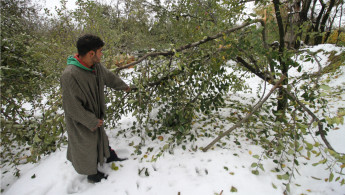Untimely Kashmir snowfall puts farmers' hopes on ice
The tourists who visit Kashmir long to see the snow in the beautiful valley and the recent fall was a joyous moment for many who had come here. But it has brought distress to local residents, particularly farmers and fruit growers.
They have incurred huge losses due to this untimely snowfall. Many fruit growers have yet to harvest their apple crop, and their annual yield lies ruined.
On Sunday, Reyaz Ahmad, a fruit grower from South Kashmir visited his orchard after a few hours of snow. Upon seeing his field, Ahmad fell down to his knees. Not a single tree had escaped damage.
"I have lost my parents a few years back, which left me devastated for so long - and this moment was again no less than losing my parents," Ahmad told The New Arab.
Ahmad has taken a loan of INR 2 lakh ($2,750) under the Kisan credit card, a scheme that provides loans to farmers for agriculture and horticulture purposes. "I don't think I will be able to pay back the loan as the damage caused to my orchard seems impossible to recover, and I don't have hopes of good apple production," he said.
There are hundreds of distraught farmers like Ahmad who have incurred this huge loss - not only to their orchards but to this year's apple production as a whole.
Many growers had harvested the apples and were in the process of packing - the fruit bundled up on the ground, only to be covered by a blanket of snow. In a viral video on social media one farmer was seen sobbing and wailing while shoveling away the snow from the heap of apples buried underneath.
"Snow has ruined all my crop, where will I go now? What will I do? God! Have pity on me," he is heard saying.
| Facebook Post |
The Kashmir Chamber of Commerce and Industries says the loss to the fruit industry is more than INR 500 crore ($69,195,000).
"Preliminary reports received from various fruit associations including Anantnag suggest that losses over INR 500 crore have been incurred and irreparable damage has been caused to trees, plantations and orchards. We appeal to the whole community to stand by our brothers in distress and extend support in whatever manner possible," the statement said.
The few hours of snowfall not only damaged harvests and orchards but the whole valley plunged into darkness as electricity shut down, revealing the failure of government machinery. For a week, netizens appeared on social media to criticise the government's inability to cope with the problems created by 3-4 inches of snow.
In Kashmir, autumn starts from August and lasts until late November. It usually snows only when trees have fully shed their leaves. For the past two decades, there have only been a few instances of snow in early November.
The last two winters remained almost dry, leaving farmers unprepared this year. Most had not harvested their crops in early autumn.
Experts believe the erratic weather is due to climate change. "Unusual weather which includes dry winters and early snowfall is the result of global warming," Shakil Ramshoo, head of earth sciences at University of Kashmir, told The New Arab.
Those who had harvested stored the apple boxes outside, and many trucks carrying apple boxes were stranded on the National Highway, adding to the worries of the fruit growers.
"I have been here for the last two days; authorities didn't allow us to move forward. I am worried that the fruit may get damaged," a truck driver told The New Arab on Sunday when traffic was yet to clear from the route.
Reports also say that 120 people were rescued from the Mughal Road, the alternative route that connects Kashmir to rest of India.
Horticulture is the backbone of Kashmir's economy. There are 144,825 hectares dedicated to apple-growing in Kashmir, producing nearly 1.7 million tons of apples. Kashmir's exports have been valued at INR 6000 crore ($826,860,000).
Ahead of Diwali, a Hindu festival that was celebrated on November 7 this year, fruit growers delayed the harvest in hopes of getting a better price for the festival.
Mohammad Ashraf was lucky to reach Jammu fruit market safely by November 2 with 230 boxes of apples.
"It is fortunate that I sold my apples just one day before the snowfall - but I am worried about my orchard, it has incurred huge damage," he told The New Arab.
Kashmir has been in the grip of conflict for more than three decades. The valley is disputed between India and Pakistan, both nuclear nations govern it in part and claim it in its entirity. While people have been protesting and many young boys have taken up arms to fight Indian rule, the region witnesses violence on a daily basis.
Strike calls issued by separatist leaders follow killings of militants and civilians, which incur further losses to business. Losing hope in the tourism sector, many have turned to horticulture and agriculture.
Javid Ahmad runs a shop in one of the famous tourist spots in South Kashmir. He feels that tourism has lost its charm in Kashmir, and he is barely able to provide for his family of four. Ahmad planted around 20 trees on agricultural land some seven years back.
"The plot of land started bearing fruits a year back. It had 30 boxes last year and this year I harvested 55 boxes. After seven years I started getting a little income from this, but I think the loss can't be recovered in the next four to five years," said Ahmad. "I am left with no hope."
Aijaz Nazir is a freelance journalist from India. He has been published in Tehelka, Firstpost, Huffington Post and the Asia Times Online.






